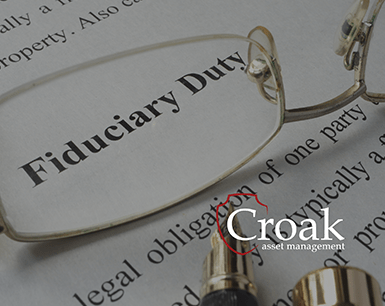The Power of Trust: Why Fiduciary Wealth Managers Are the Right Choice

In the complex world of wealth management, one concept stands out as the cornerstone of a successful client-advisor relationship: fiduciary duty. A fiduciary wealth manager is an investment professional who is legally bound to act in the best interests of their clients. Croak Asset Management CEO and Senior Wealth Advisor, Tim Croak, said:
“In this era where information is so plentiful it makes the role of financial advisor even more apparent – Our job is to wade through all of the information to discern the small percentage that is correct, meaningful, and relevant and use that information to give to our clients what we have always given historically – perspective and judgment.”
In this blog post, we will explore the role of a fiduciary wealth manager, discuss the importance of fiduciary duty, outline how to choose the right advisor, and shed light on the benefits of working with a fiduciary, as well as the risks associated with non-fiduciary advisors.
What is a Fiduciary Wealth Manager?
A fiduciary wealth manager is an individual or firm entrusted with managing the assets and investments of clients. They are legally obligated to put their clients’ interests ahead of their own and act with utmost honesty, integrity, and transparency. This fiduciary duty ensures that the client’s goals and financial well-being are the primary focus of the advisor’s recommendations and actions.
The Importance of Fiduciary Duty:
Fiduciary duty is crucial because it establishes a relationship of trust and confidence between the advisor and the client. By upholding fiduciary responsibilities, wealth managers are bound to provide objective and unbiased advice, avoid conflicts of interest, and disclose any potential conflicts that may arise. This duty creates a fiduciary standard, elevating the level of professionalism and ethics within the wealth management industry.
How to Choose a Fiduciary Wealth Manager:
When selecting a fiduciary wealth manager, there are several key factors to consider.
- Verify their credentials and qualifications. Look for certifications such as Certified Financial Planner (CFP®), Chartered Financial Consultant (ChFC®), Chartered Life Underwriter (CLU®), Accredited Investment Fiduciary (AIF®), Professional Plan Consultant (PPC®), and Accredited Wealth Management Advisor (AWMA), which demonstrate expertise and commitment to ethical standards.
- Assess their experience and track record which you can do online by look at brokercheck.com for any historical complaints or U-4 findings. A seasoned wealth manager with a proven history of successful client outcomes is likely to inspire confidence.
- Evaluate their communication skills. Effective communication ensures that your advisor understands your goals and keeps you informed throughout the investment process. The use of technology such as proprietary apps to view portfolio values, updates, and performance, newsletters, notices, transactions, should be an important driver to transparency in communication.
- A good advisor is also about using on-going analysis and portfolio monitoring and movement based on market conditions, not just “buy and hold” a set allocation. In addition, they should provide advanced planning – not just investments – but retirement, tax, college, estate, and insurance planning so everything can be brought in and work together with an investment philosophy. In addition, some advanced investment vehicles could be recommended such as real estate investment trusts, tax shelters, and hedge funds for highly sophisticated investors.
The Benefits of Working with a Fiduciary Wealth Manager:
- Client-Centric Approach: Fiduciary wealth managers prioritize their clients’ best interests above all else. They tailor investment strategies to individual goals, risk tolerance, and financial circumstances, ensuring personalized solutions.
- Unbiased Advice: Fiduciaries are legally bound to avoid conflicts of interest, recommendations that are free from ulterior motives or hidden agendas. Unbiased Advice: Fiduciaries are legally bound to avoid conflicts of interest, promoting recommendations that are free from ulterior motives or hidden agendas.
- Transparency and Trust: Fiduciary wealth managers are obligated to disclose all fees, potential conflicts, and any other relevant information, fostering a relationship built on trust and transparency.
- Comprehensive Financial Planning: Fiduciaries go beyond investment management, offering holistic financial planning services that encompass retirement planning, tax optimization, estate planning, and more.
With some final thoughts, Tim passes along some key wisdom after being in this business for 42 year and said
“When you decide to invest you have to be prepared for the journey and it’s like going down a hill on skis – you don’t know if you are going down a green hill, a double black diamond, or a glacier but know for sure that there will be days it seems like all of the above. Your job as an investor is to stay in your ski’s and hold on to your poles. You will end up at the end of the ride in great shape and having a lot of fun”
If you are interested in learning more about how Croak Asset Management allows people to discover a different type of wealth management experience, click here to connect with us and start investing today.
Croak Asset Management, LLC is registered as an investment adviser with the SEC. Croak Asset Management, LLC only transacts business in states where it is properly registered or is excluded or exempted from registration requirements. For a detailed discussion of Croak Asset Management, LLC and its investment advisory services and fees, see the firm’s Form ADV on file with the SEC at adviserinfo.gov.
Information contained herein does not involve the rendering of personalized investment advice but is limited to the dissemination of general information. A professional adviser should be consulted before implementing any of the strategies or options presented. Past performance may not be indicative of future results. Therefore, no current or prospective client should assume that the future performance of any specific investment, investment strategy (including the investments and/or investment strategies recommended by the adviser), or product referred to directly or indirectly, will be profitable or equal to past performance levels.
